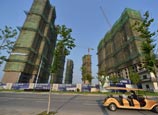
 |
Bank and property shares led a slumping market on Wednesday to a six-month low, as expectations of liquidity tightening grew and concerns mounted about a resumption of initial public offerings as early as July.
The benchmark Shanghai Composite Index slid 0.73 percent to 2,143.45 points, while volume climbed to 67.1 billion yuan ($10.9 billion) from 63.6 billion yuan on Tuesday.
China Everbright Securities Co Ltd slid 4.28 percent to 12.09 yuan after the Xinhua News Agency reported it might be penalized by the securities regulator for having sponsored companies involved in financial fraud to apply for IPOs.
China Citic Bank retreated 1.8 percent to 3.92 yuan.
Turnover in the A-share market has remained low since the Dragon Boat Festival break earlier this month. Analysts said investors are concerned about the upcoming resumption of IPOs, which investors believe could drain liquidity.
"I think currently the biggest pressure comes from the possible (resumption of) IPOs. Industry insiders expect a large number of new shares will be issued by the end of July, which is usually a bearish signal," said Nowa Zhi, an analyst with a public offering fund management company in Shanghai.
He said the economic statistics have been disappointing as well, showing no clear signs of a strong recovery, and investors are pessimistic.
But there has been some positive news as well. Central Huijin, an arm of China's sovereign-wealth fund, last week raised its stake in China's "big four" banks, injecting confidence into the market.
Chinese securities authorities halted IPOs in October in a bid to fight financial fraud in IPO applications and protect investors. Industry insiders and media reports have said the securities regulator may resume IPO approvals as early as the end of July.
Concerns about a credit crunch have also spread among investors as China's key interbank rate spiked in recent weeks. The three-month Shanghai interbank offered rate was 5.329 percent on Tuesday, according to the National Interbank Funding Center. It rose as high as 6.9 percent on Friday.
China's central bank has adopted a hawkish stance toward market liquidity since May, to clamp down on rising, risky shadow banking activities and huge inflows of hot money, traders said.
News reports on Wednesday said lenders are urging the central bank to cut the required reserve ratio to boost liquidity.
"However, with the central government apparently more tolerant of slower growth and concerned about financial risks, the People's Bank of China seemed to be keen on maintaining a 'prudent' monetary policy stance," Wang Tao, an economist with UBS Securities, wrote in a note on Tuesday, highlighting the risk of a liquidity crunch.
News about emerging property tax policies hit developers' shares on Wednesday.
Beijing, Shenzhen, Nanjing, Hangzhou and Qingdao have drafted property tax trial plans, the China Securities Journal reported, citing unidentified sources.
A gauge of property stocks slid 1.2 percent, the most among five industry groups. China Vanke, a leading property developer, sank 2.4 percent to 10.19 yuan.
However, overseas investors seem to have kept faith in the Chinese equity market.
Five qualified foreign institutional investors got the green light in May to invest in yuan-denominated stocks, an increase from three in April. The move brought the total number of such institutional investors to 225.
Although Chinese mainland stocks were among the worst performers in 2012, the market remains attractive to investors seeking long-term returns as the country is poised to become an economy driven by domestic consumption, innovation and an aging population, Fidelity Worldwide Investment said in its recent annual report.
















 Shocking! Hairy stocking to beat sex harassment
Shocking! Hairy stocking to beat sex harassment


![]()
